By Robert W. Bertram
1. Peccator Peccatorum [Sinner of Sinners]
The sinlessness of Christ, indispensable as this was for Luther’s christology, was seldom the major point at issue. In fact, Christ’s innocence, readily enough accepted by Luther’s opponents, threatened to overshadow what was equally essential to Christ’s redemptive achievement: that “for our sake God made Christ to be sin,”1 “a curse for us,”2 or in the words of Isaiah, “numbered among the thieves.”3 In Luther’s own words, Christ “has sinned or has sins,”4 he was “a sinner of sinners,”5 indeed “the highest, the greatest, and the only sinner.”6
We confront a problem in predication. How can the theological predicate, est peccator [is a sinner], really and significantly be about the subject, this purissima persona [purest of persons], deus et homo [God and man]? By reason of what can he be both the sinless God-man and at the same time a sinner? And we encounter Luther’s characteristic solution. What finally makes the predication meaningful and real is that it is soteriologically necessary. Unless Christ was our sinner, we ourselves must be; but since through him we are not sinners, it follows that he was a sinner and had to be. “Our sin must be Christ’s own sin, or we shall perish eternally.”7 If he is innocent and does not carry our sins, then we carry them and shall die and be damned in them. ‘But thanks be to God, who gives us the victory through our Lord Jesus Christ!’ Amen.”8
2. Cernere Antitheses [To Discern the Antitheses]
As usual, Luther’s positive assertions are unintelligible apart from the antitheses they ne-gate. “…When two opposites are placed side by side, they become more evident.”9 It is important “to discern the antitheses,”10 and not only for polemical reasons — to “drag them
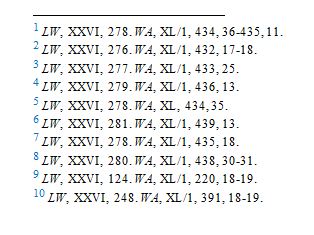
into the light, in order that the doctrine of justification, like the sun, may reveal their infamy and shame”11— but also for affirmative reasons. The unevangelical antitheses
should not be lightly dismissed or consigned to oblivion but should be diligently considered. And this, by contrast, serves to magnify the grace of God and the blessings of Christ.12
Presumably, then, if the opponents deny that Christ is a sinner, Luther’s polemic must serve both a negative and a constructive function. First, he must reveal the “infamy and the shame” of their antitheses. But that still leaves the second, the constructive question. What is there about their false antithesis by contrast with which, and only by contrast with which, Christ’s sinnerhood takes on its fully positive meaning? Offhand, the opponents’ reverent insistence upon Christ’s sinlessness would seem to be by far the more positive of the two christologies. It is not immediately apparent how Luther can exploit that antithesis in the interest of his own contrary and apparently pessimistic insistence upon Christ’s sin, and how in the bargain Christ’s sinnerhood can be “magnified” into, as Luther calls it, our “most delightful comfort.”13 Still, as we shall see, unless Christ’s sinnerhood does appear as “delightful” as that, it has no warrant as a predicate of its subject – that is, as the real sin of a really sinless God-man.
What actually is the antithesis to saying that Christ is a sinner? One would think it is the simple counter-assertion, Christ is not a sinner. Still, that is not the extent of the opposition. Just as Luther’s affirming Christ’s sinnerhood is necessitated by soteriological, not only christological, considerations, so the opponents’ denying Christ’s sinner-hood is likewise inspired by their contrary soteriology. And there, for Luther, lies their “infamy and shame.” The papists’ real motive for clearing Christ of sin, Luther claims, is not to honor Christ, as they would pretend, but rather to promote “justification by works.”14 “They want … to unwrap Christ and to unclothe him from our sins.”15 However, “to make him innocent” is “to burden and overwhelm ourselves with our own sins, and to behold them not in Christ but in ourselves.”16 And the reason the papists do this is that they prefer to have their sins removed and replaced, not in Christ, but within their own selves – “by some opposing motivations, namely, by love,”17 or by the sort of faith which is actualized in love. It is this wish of theirs to be valuable inherently and biographically which prompts them to protest, with such deceptive reverence for Christ, that he “is not a criminal and a thief but righteous and holy,”18 or that “it is highly absurd and insulting to call the Son of God a sinner and a curse.”19 “Perhaps,” Luther shrugs, “this may impress the inexperienced, for they suppose that the sophists are … defending the honor of Christ and are religiously admonishing all Christians not to suppose wickedly that Christ was a curse.”20 Yet if the sophists had their way, if it were true that Christ “is innocent and does not carry our sins, then we carry them

and shall die and be damned in them.”21 But, says Luther, “this is to abolish Christ and make him useless.”22 That is the “shame and infamy” of denying Christ’s sinnerhood.
Then how does the sophists’ denial, their divesting Christ of our sins, now provide the foil for Luther’s positive thrust – serving, “by contrast, to magnify the grace of God and the blessings of Christ?”23 Ironically, it was the scholastics’ (and the Scriptures’) whole profound understanding of moral predication, that same grammar of legality which insures that our sins are ours and no one else’s and least of all the Son of God’s, which now furnishes Luther with the very key for discovering the ways in which sin, our sin, belonged instead to the Son of God. True, our sins did not belong to him in the sense that he committed them. Still, it is that kind of culpability, a guilt by active commission, to which Luther appeals for a comparison to underscore how real a sinner Christ was. Our sins “are as much Christ’s own as if he himself had committed them.”24 We can state the matter another way: Our sins are Christ’s, not by means merely of some transcendent, super-historical transaction, in which God simply “regards” our sins as his or simply “imputes” our sins to him, but by means also of his own immanent, historical “bearing” of those sins – “as much Christ’s own as if he himself had committed them.” He did not commit them, of course. But that does not mean for Luther that there is only one other way by which our sins can then be his, namely by divine imputation. No, Luther comes as close as he can to saying our sins are Christ’s by reason of his committing them, but without actually saying that. And, as we shall see, Luther adopts this procedure not for rhetorical effect but for an intensely important theological purpose.
How much our sins truly are “Christ’s own” Luther elaborates in half a dozen ways, re-calling strangely the very ways in which our sin ought ordinarily be our own. These half dozen variations on how our sin is rightfully and culpably predicated of Christ (culminating in the reminder that his guilt was after all intentional) will occupy us in the next six sections of this essay. Then, in the essay’s concluding section, we shall note how it was precisely this recourse to ordinary moral predication in his portrayal of Christ’s sinnerhood which enables Luther finally to explode that type of predication in his discussion of Christ’s surprise victory. In other words, it was just because Christ “was made under the law” that he could be the death of the law – the law and its whole tyrannizing mode of predication. For, in the end, his intentional self-incrimination, which rightfully rendered him guilty before the law, was the selfsame intention which in turn incriminated and annihilated the law – his intention, namely, of invincible divine mercy. Here, in the selfsameness of Christ’s loving will, willing to be a sinner in order to be a Redeemer, Luther finds the secret bond which unites the personal subject with its paradoxical predicate, the sinless God-man with the sins of all men. Nevertheless, as we have said, their sins are Christ’s own, not simply by a transcendent fiat of divine will, but in such a way that, when that will becomes immanent in this Man in this law-bound world, it becomes a guilty will. In other words, our sins are Christ’s as really and immanently as they are ours – that is, “as if he himself had com-mitted them.” But all this, for a very “delightful” purpose.
3. Sub lege, ergo peccator [Under the Law; therefore, a Sinner]
For example, first of all, our sins are so much Christ’s own that we dare not say he bore merely our punishment. What he bore was our sin. If he did not, the law had no reason to

punish him. Luther refuses to explain away Paul’s statement that Christ was made a curse for us, or that he was made sin for us, by so diluting “sin” and “curse” that they mean merely the consequences of sin.25 Such an exegetical tour de force, Luther argues, would be an evasion of the clear meaning of the text – and, let us note, not only of the text’s words but also of the text’s purpose, its native reasons. The critics who “want to deny that [Christ] is a sinner and a curse” prefer to say rather that he “underwent the torments of sin and death.”26 But that is not all that Paul says, and “surely these words of Paul are not without purpose.”27 Neither are the words of John the Baptist, about “the Lamb of God.” Nor the cries of the psalmist: “My iniquities have overtaken me;” “Heal me, for I have sinned against thee;” “O God, thou knowest my folly.” (“In these psalms the Holy Spirit is speaking in the person of Christ and testifying in clear words that he has sinned or has sins.”)28 These “clear words” are all to some purpose, testifying as they do to the real sin, and not merely to the suffering, of Christ. And remember the way Isaiah speaks of Christ, “God has laid on him the iniquity of us all.” Of course, for Christ to bear iniquities, Luther agrees, does include his bearing our punishment. “But why is Christ punished? Is it not because he has sin and bears sins?”29 That must be Paul’s reason, too, for applying to Christ the passage from Deuteronomy, “Cursed be everyone who hangs on a tree,” the disclaimers of Jerome to the contrary notwithstanding.30
For what is it that causes the law, the whole retributive order of things, to retaliate with punishment at all? What else but the culprit’s sin and accursedness? If our sin had not really been Christ’s, he could not have been liable to punishment, he could not have been killed. “For unless he had taken upon himself [our] sins, … the law would have had no right over him, since it condemns only sinners and holds only them under a curse, … since the cause of the curse and of death is sin.” It is for that reason that the law says to Christ,
Let every sinner die! And therefore, Christ, if you want to reply that you are guilty and that you bear the punishment, you must bear the sin and the curse as well.31
For that reason, accordingly, Paul was correct in applying to Christ “this general law from Moses.”32 To predicate sin and accursedness of Christ is lawful and rational: “Christ hung on a tree, therefore Christ is a curse of God”33 – a lawfully accursed sinner, not merely the innocent bearer of sin’s punishments.
4. Socius Peccatorum [Associate of Sinners]
Second, our sins are so much Christ’s own that, when he fraternized with sinners, he him-self stood condemned for the company he kept. And rightly so. For, says Luther, “a magistrate regards someone as a criminal and punishes him if he catches him among thieves,
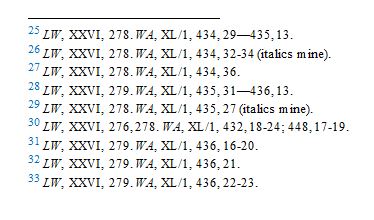
even though the man has never committed anything evil.”34 “Among thieves,” indeed. Jesus was consorting with the enemies of God. He was a socius peccatorum.35
Of this Christ, Luther complains, “the sophists deprive us when they segregate Christ from sins and from sinners and set him forth to us only as an example to be imitated.”36 They err in their too aloof definition of Christ, but also in their too sanguine definition of “the world,” in which Christ dwelt. For, says Luther, what is required here is that “you have two definitions, of ‘world’ and of ‘Christ’.”37 That is to say, we must remember that Christ delivered us, “not only from this world but from this ‘evil world’,38 “from this evil age, which is an obedient servant and a willing follower of its god, the devil.”39 What links sinner to sinner in this worldwide syndicate of evil is not merely that they all misbehave in the same way, or even that they all aid and abet one another. Rather they are all under the tyrannical jurisdiction of a common demonic lord, so that, whatever their efforts at good behavior, “the definition still stands: You are still in the present evil age ….”40 What makes it evil is that “whatever is in this age is subject to the evil of the devil, who rules the entire world.”41 The company of sinners is a kingdom, a realm, of evil.
This realm, being under divine curse, is off-limits. Yet it is into this realm that Christ came. “He joined himself to the company of the accursed.”42 “And being joined with us who were accursed, he became a curse for us.”43 “Therefore when the law found him among thieves, it condemned and executed him as a thief.”44
5. Ego commisi peccata mundi [I Have Committed the Sins of the World]
Third, our sins are so much Christ’s own that, no matter who committed them originally, all of them have now been committed, in effect, by Jesus Christ personally. The sins he bore, as John says, are nothing less than “the sins of the world.”45 And “the sin of the world,” as Luther understands the phrase, is not sin in general. It is no abstract universal. It is exhaustive of every actual sinner and sin in history: “not only my sins and yours, but the sins of the entire world, past, present, and future ….”46 Luther represents Christ as saying, “I have committed the sins that all men have committed”)47 – “the sin of Paul, the former blasphemer, … of Peter, who denied Christ, of David, … an adulterer and a murderer and who caused the Gentiles to blaspheme the name of the Lord.”48

Still, even in the face of such specific enumerations, we in our false humility are wont to exempt Christ from our sins, at least from those sins of ours which seem to us more than Christ should be expected to bear and which, alas, we alone must bear.
It is easy for you to say and believe that Christ, the Son of God, was given for the sins of Peter, Paul, and other saints, who seem to us to have been worthy of this grace. But it is very hard for you, who regard yourself as unworthy of this grace, to say and believe from your heart that Christ was given for your many great sins.49
But false humility is what this is, and disdain for Christ. Luther shows small sympathy for the neo-pharisaic pseudo-publican who prays, “God be merciful to me a sinner,” and yet who means no more by “sinner” than the doer of trivial sins, “an imitation and counterfeit sinner.”50 “Christ was given, not for sham or counterfeit sins, nor yet for small sins but for great and huge sins, not for one or two sins but for all sins.”51 “And unless you are part of the company of those who say ‘our sins,’… there is no salvation for you.”52
Conversely, it is only because “the sin of the world” is no mere abstraction but an enumerative totality of every real sin and sinner that Luther can perform the inference he repeatedly does: Christ is “the one who took away the sins of the world; if the sin of the world is taken away, then it is taken away also from me ….”53 Accordingly, Luther describes the Father sending his Son: “Be Peter the denier; Paul the persecutor …; David the adulterer; the sinner who ate the apple in Paradise; the thief on the cross. In short, be the person … who had committed the sins of all men.”54
6. Ipsum Peccatum [Sin Itself]
Fourth, our sins are so much Christ’s own that, by his acknowledging them as his, he him-self – not only the sins he bore, but he who bore them – becomes a sin and a curse. This drastic conclusion is suggested by Paul’s strong use of “curse” in its substantive rather than its adjectival sense.
Christ is said to have been made a curse and not merely accursed, not just a sinner but sin itself. And isn’t this the way it is, Luther recalls, whenever “a sinner really comes to a knowledge of himself …”? He can no longer distinguish nicely between his sin, on the one hand, and himself, on the other, as though the two were still separable. “That is, he seems to himself to be not only miserable bat misery itself; not only a sinner and an accursed one, but sin and the curse itself.”55 And not only is that what he seems to be. A man who feels these things in earnest really becomes (fit plane) sin, death, and the curse itself.”56
This recalls that classic discussion of man the sinner, six years before, as Luther pursued that matter against Erasmus. When a man knows himself a sinner, he becomes in that act a sinner all the more. For to know that I am a sinner is to know, by verus sensus [proper sense] and at least by definition, that I anger God. Yet if I believe that I anger God, then of course I am disbelieving that I delight God, Still, as Luther reminds Erasmus, that is exactly
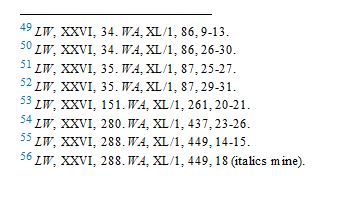
the impossible thing which God demands: That we who do indeed anger him must never-theless believe we please him. So the more certainly a man recognizes he is a sinner, under the divine curse and forsaken of God, the more certainly his sin is “magnified” – his sin of unbelief. Although the sinner admits his sin, (and it is right and true that he should) yet he does not by that act become right and true himself. By repudiating the sins which God repudiates, the penitent does not thereby extricate himself from his sins, as though the sins which he repudiates were one thing and the self which does the repudiating were something else, something creditable; as though the predicates were separable from their subject. And the reason they are not separable is that the subject, the very self, who confesses his ac-cursedness (and rightly so) thereby incriminates himself anew by denying (contrary to God’s command) that he pleases God. That is why “a man who feels these things in earnest really becomes sin, death, and the curse itself” – “not only … adjectivally but substantively.”57
Luther is all but saying the same thing of Christ. Although Christ himself did not commit sin, yet he so acknowledged our sins as his own and himself accursed because of them that this very acknowledgement alienates God and makes Christ a sinner, not only adjectivally but substantively.
All our evils … overwhelmed him once, for a brief time, and flooded in over his head, as in Psalm 88:7 and 16 the prophet laments in Christ’s name when he says: ‘Thy wrath lies heavy upon me and thou dost overwhelm me with all thy waves,’ and: ‘Thy wrath has swept over me, thy dread assaults destroy me.’58
Luther can even say of Christ: “He is not acting in his own person now; now he is not the Son of God, born of the virgin, but he is a sinner ….”59 For that is the way it is with the law. “All it does is to increase sin, accuse, frighten, threaten with death, and disclose God as a wrathful Judge who damns sinners.”60 And “where terror and a sense of sin, death, and the wrath of God are present, there is certainly no righteousness, nothing heavenly, and no God ….”61 In the case of Christ, the law raged even more fiercely than it does against us. “It accused him of blasphemy and sedition.”62 “It frightened him so horribly that he experienced greater anguish than any man has ever experienced.”63 Witness his “bloody sweat, the comfort of the angel, his solemn prayer in the garden, and finally … that cry of misery on the cross, ‘My God, my God, why hast thou forsaken me?’”64 “A man who feels these things in earnest really becomes sin, death, and the curse itself.”65
7. In Copore Suo [In His Body]
Fifth, our sins are so much Christ’s own that he bore them not only psychologically but also, as we do, bodily – “in his body.” That prepositional phrase, sometimes quoted directly from I Peter 2:24, occurs so often and so habitually in Luther’s christological discussions

that its very frequency demonstrates how somatically Luther conceived of sin, whether ours or Christ’s.
What precisely Luther understood the connection to be between sin and bodily existence (if indeed he did understand the connection precisely) is well-nigh impossible to determine. For that matter, whatever understanding Luther did have of this connection might well prove unintelligible to an age like ours which, for all its appreciation of psychosomatic man, still inclines to spiritualize sin, and death as “the wage of sin.” What we can say about Luther, at the very least, is that he would have found it hard to speak of our sin as really ours, and hence of our sin as really Christ’s, apart from the bodies in which our sin rages and, in Christ’s body, is destroyed. Of course, such expressions as “the body of sin” and “in his body on the tree” were not original with Luther but came to him on rather high recommendation.
It is true, Luther has been commended for not succumbing to the gnostic temptation, as some theologians have, of equating the New Testament “flesh” with sins merely of the body. That Luther does warn against this error can be seen from his arguments against Erasmus.66 In his Galatians lectures, likewise, he reminds his students: “Now in Paul ‘flesh’ does not, as the sophists suppose, mean crass sins…. ‘Flesh’ means the entire nature of man, with reason and all his powers.”67 Neither are crass, bodily sins, just because they are more obvious, for that reason more culpable than the sins of the spirit. On the contrary, the sins against the first table are more to be feared than the sins against the second table,68 the “white devil” more than the “black devil.”69 Nor could Luther, any more than he could say all sin is of the body, say that all bodily existence is sinful. We need only to recall that the Son of God, by being “made a true man by birth from the female sex,” was not by that token a sinner.70
Nevertheless, Luther seems equally sure that there is for Christ no bearing of our sins with-out his doing so “in his body.” Why? In one passage, and perhaps no oftener than that, Luther seems to explain Christ’s bodily bearing of our sins in terms of a theory of “satis-faction.” Christ, he says, “took these sins, committed by us, upon his own body, in order to make satisfaction for them with his own blood.”71 Yet the theme of satisfaction–a term which Luther seldom uses and, when. he does, tends to use disparagingly72 – is not characteristic of his christological language, even when he speaks of Christ’s “blood” (which is usually coupled with the language of redemption and sacrifice and not of satisfaction.73)
No, the function which Luther most usually ascribes to Christ’s bearing our sins “in his body” is that, by his bodily dying, he put those sins in his body to death. “He bore and sustained them in his own body.”74 where, by his death and apparent defeat, they were exterminated. Or, in Luther’s own strong and variegated language, they were “destroyed,” “conquered,” “removed,” “annihilated,” “purged ” “expiated,” “abolished,” “killed,”

“buried,” “damned,” “devoured.”75 Christ “conquers and destroys these monsters – sin, death, and the curse – without weapons or battle, in his own body and in himself, as Paul enjoys saying (Col. 2:15): ‘He disarmed the principalities and powers, triumphing over them in him’ .”76 “All these things happen … through Christ the crucified, on whose shoulders lie all the evils of the human race – … all of which die in him, because by his death he kills them.”77
Something else remains to be said. Christ bears our sins in his body, not only because they are thereby destroyed, but also because they are ours. There is no question in Luther’s mind that Christ could have vanquished the tyrants without submitting to the cross, by an outright exercise of his divine sovereignty. But such an alternative completely overlooks how inti-mately his victory was to be ours, and how it was therefore to be achieved “in our sinful person.”78 Luther has Christ saying,
I could have overcome the law by my supreme authority, without any injury to me; … but for the sake of you, who were under the law, I assumed your flesh; … I went down into the same imprisonment … under which you were serving as captives.79
That is why “all men, even the apostles or prophets or patriarchs, would have remained under the curse [1] if Christ had not put himself in opposition to sin, death, the curse …, and [2] if he had not overcome them in his own body.”80 For, as Luther seems to see it, Christ does not bear our sin as ours unless he assumes “our sinful person,” and our sinful person is inseparable from our bodies.81 “The old man … is born of flesh and blood.”82 John Osborne has captured a characteristic insight of Luther’s in the line, spoken by Hans to his son: “… You can’t ever get away from your body because that’s what you live in, and it’s all you’ve got to die in ….”83
Therefore, even though Christ in his incarnation through the Virgin was the purest of per-sons, and even though since his resurrection “there is no longer the mask of the sinner or any vestige of death” in him,84 still, as he describes his historic mission, “I shall empty myself, I shall assume your clothing and mask, and in this I shall walk about and suffer death, in order to set you free from death.”85 So “even though you know that he is God and man,” “you do not yet have Christ” until you know that, “putting off his innocence and holiness and putting on your sinful person, he bore your sin.”86 “He attached himself to those who are accursed, [not only by occupying the same world with them, nor only by fraternizing with them, but by] assuming their flesh and blood.87 Nor dare his assumption
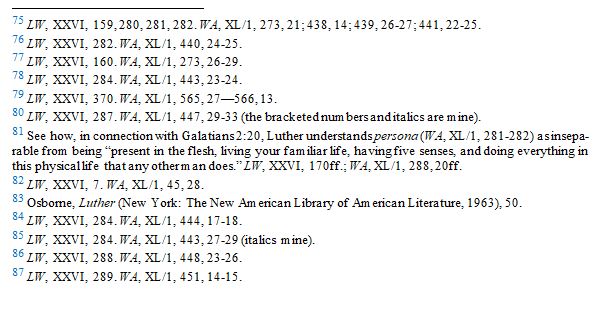
of our flesh be understood merely as a sinless incarnation, “in a purely physical way.”88 Rather “he took along with him whatever clung to the flesh that he had assumed for our sake.”89 Granted that this mystery “is impossible to understand and to believe fully, because all this is so contradictory to human reason.90 Nonetheless, the whole thrust of the mystery is clear: “Just as Christ is wrapped up in our flesh. and blood, so we must … know him to be wrapped up in our sins.91
8. Sponte [Willingly]
Sixth, our sin is so much Christ’s own that, since it is his by choice, it incriminates his very motives, his innermost self. Because he attached himself to our sins “willingly” (sponte), he has only himself to thank for the fact that he is liable for them. “Because he took upon himself our sins, not by compulsion but by his own free will, it was right for him to bear the punishment and the wrath of God ….”92
The deliberate, intentional character of Christ’s sinnerhood seems to illustrate most graphically for Luther how truly Christ bore our sin “in himself.” And it may be that at this point Luther’s meaning comes closest to being intelligible to an age like our own, with its definitions of selfhood in terms of “responsibility” and “decision.” “Modern man,” Bultmann reminds us, “… bears the responsibility for his own thinking, willing, and doing.”93 We are reminded once more of Luther’s exchange with “the modern man,” Erasmus. Even though sinners are like compliant beasts ridden by their rider, the devil, or like evil seeds who are never free from the pressures of the Creator to produce their evil fruit, still what identifies their sin as characteristically their own is that it always expresses what they themselves will and are. It is exactly as the ones who will and think as they do that God “necessarily foreknows” them as sinners. So understood, Luther is even willing to grant Erasmus that the determinative function of the human ego is “the throne of will and reason,” “his rational and truly human part.”94 Similarly, in his lectures on Galatians, Luther can agree with the moral philosophers that what characterizes a man’s actions as really and personally his is the ethical quality of his motives, his rational will.95
It is against this background that we might appreciate the intensive emphasis which Luther gives to the fact that Christ bore our sin “willingly.”96 In an earlier quote we hard Luther speak of Christ as a socius peccatorum, and heard him explain, “Thus a magistrate regards someone as a criminal and punishes him if he catches him among thieves, even though the man has never committed anything evil ….”97 But in the case of Christ this was no arbitrary guilt by association. Christ could not plead that, though he was indeed among sinners, he was there in innocent ignorance or again his will. For, as Luther adds immediately, “Christ was not only found among sinners; but of his own free will … he wanted to be an associate
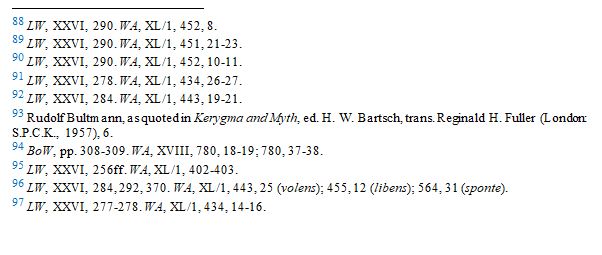
of sinners ….”98 Accordingly, “the law came and said: ‘Christ if you want to reply that you are guilty and that you bear the punishment, you must bear the sin and the curse as well.”99
9. Ex Magna Charitate [Because of (His) Great Love]
It was not for nothing that Luther invoked every biblical description of Christ’s sinnerhood which would show that, according to the moral grammar of predication, Christ was right-fully and legally subject to the law’s condemnation, that our sins “are as much Christ’s own as if he himself had committed them.”100 For, by granting the legal order its maximum due, it is now drawn into the fray, not at its worst – not as the emasculated legalism of the scholastics, not as some miscarriage of justice by the Sanhedrin – but at its best. As a con-sequence, it is the divine law in its own holy integrity – that is, as it justly condemns every sinner, no matter how pious, as the enemy of God – which now does what it has to do to this peccator peccatorum. And it is this same law at its holiest and best which, in the mirabile duellum [amazing duel] which ensues, is eternally discredited. The other antagonists as well – sin, devil, curse, wrath, death – are present not as caricatures but at the height of their power.
It is only because the enemies involved are the real enemies—the ones, in other words, with whom men have to reckon for life and death before God–that the mirabile duellum becomes indeed a “very joyous duel,” iucundissimum duellum.101 Here we find Luther ap-plying his own hermeneutical rule, exploiting the antithesis of the opponents (and doing so even more trenchantly than he did in his dialectical display against Erasmus) in order not only to “reveal their infamy and shame”102 but to celebrate in turn our “knowledge of Christ and most delightful comfort.”103 The whole legal mode of predication, so elaborately employed for what seemed a merely negative detailing of Christ’s sinnerhood, now “by contrast serves to magnify the grace of God and the blessings of Christ.”104
“The grace of God and the blessings of Christ”–that is the secret of the iucundissimum duellum. Or rather what is the secret is that this divine grace, “the blessing,” is locked in mortal combat with the curse “in this one person.” “Now let us see,” asks Luther, “how two such extremely contrary things come together in one person.”105 The answer, as might be expected, is that when they do come together it is the divine powers – divine righteous-ness, life, and blessing – which of course prevail over their lesser contraries, sin and death and the curse.106 But the secret, indeed the prerequisite, of the victory is that it all occurs “in his own body and in himself”107 Both sets of contraries are really his. If the sin had not been his, as truly as the righteousness was, the law could easily have avoided its blasphemy against him by cursing only the one and not the other. However, “he joined God and man in one person. And being joined with us who were accursed, he became a curse for us; and

he concealed his blessing in our sin, death, and curse, which condemned and killed him.”108 His intentional self-incrimination, his personal decision to attach himself to the enemies of God – the very reason he was cursed, and rightfully – was the selfsame decision of the selfsame person (the merciful decision of the divine person) which to curse was sheer blasphemy. The wonder, therefore, is not just that the curse was conquered by the blessing. The prior wonder is, Why should the curse want to attack the blessing in the first place? Luther’s answer is that, because God’s blessing and our sin were so intimately joined in this one person (as intimately as the “person” and his “work”109), therefore the curse, which had no choice but to condemn our sin, necessarily condemned the divine blessing as well. “This circumstance, ‘in himself,’ makes the duel more amazing and outstanding; for it shows that such great things were to be achieved in the one and only person of Christ.”110
We began the essay by asking, as a problem in theological predication, by reason of what can such a contradictory predicate as sin, our sin at that, really and meaningfully belong to Christ, this “purest of persons, … God and man?”111 Luther’s answer must finally be, by reason of Christ’s love. He “did this because of his great love; for Paul says [of Christ, in Galatians 2:20]: ‘who loved me’.”112 In the last analysis, the explanation of Christ’s paradoxical sinnerhood is simply that “he is nothing but sheer, infinite mercy, which gives and is given;113 “the kind of lover who gives himself for us and. .who interposes himself as the Mediator between God and us miserable sinners.114
Yet to speak of Christ as the “Mediator between God and us miserable sinners” seems to suggest that, while Christ may lovingly have predicated our sins of himself, “God” (perhaps the first person of the Trinity) may not so spontaneously concur in this predication but prefers to reserve judgment. For Luther this would be tantamount to saying that the ultimate and terrifying truth about the Divine Majesty is that he is our judge and that the whole project of overcoming his judgment and abolishing our sin must be achieved “in the person” of someone other than himself, finally in our own persons. And that is exactly the fatal heresy, Luther would say, of those who prefer to speculate about the Divine Majesty apart from Christ, and who prefer to do so just because they suppose they can face his judgment on the strength of whatever behavioral transformations occur within their own persons.
But this is to deny what Luther, as we saw previously, so vigorously affirmed: namely, that “to conquer the sin of the world, … and the wrath of God in himself–this is the work, not of any creature but of the divine power.”115 “Therefore when we teach that men are justified through Christ and that Christ is the victor over sin … we are testifying at the same time that he is God by nature.”116
Accordingly, the final explanation which really and meaningfully predicates our sin of Christ is that same loving will which he who “is God by nature” shares with his Father. “The indescribable and inestimable mercy and love of God,” who saw “that we were being

held under a curse and that we could not be liberated from it, … heaped all the sins of all men upon him.”117 The culpable decision by which Christ attached himself to the enemies of God is simultaneously the decision of this very God. “Of his own free will and by the will of the Father he wanted to be an associate of sinners.”118 Indeed, it is “only by taking hold of Christ, who, by the will of the Father, has given himself into death for our sins,” that we are “drawn and carried directly to the Father.”119 The only alternative is to withdraw our sins from Christ, hoping wanly that God might enable us to remove and replace them in our own persons, and thus to be left alone with the mortifying “majesty of God.”120
Yet even the Divine Majesty, the very name by which Luther had described the hidden and intolerable God of the De Servo Arbitrio, becomes for believers, the same God who lov-ingly destroys our sin in the person of his Son. “For this is a work that is appropriate only to the Divine Majesty and is not within the power of either man or angel – namely, that Christ has abolished sin.”121 “… The Divine Majesty did not spare his own Son but gave him up for us all.”122 The maiestas Dei [majesty of God], before whose inscrutable depths and dreadful judgments the sinner was forbidden to ask Why, now, in Christ, provides the sinner with new depths of mystery and perhaps even an answer to his question, but of an altogether different order.
The human heart is too limited to comprehend, much less to describe, the great depths and burning passion of divine love toward us. Indeed, the very greatness of divine mercy produces not only difficulty in believing but incredulity. Not only do I hear that God Almighty, the Creator of all, is good and merciful; but I hear that the Supreme Majesty cared so much for me … that, he did not spare his own Son, … in order that he might hang in the midst of thieves and become sin and a curse for me, the sinner and accursed one, and in order that I might be made righteous, blessed, and a son and heir of God. Who can adequately proclaim this goodness of God? Not even all the angels.123
By reason of what, then, is our sin Christ’s own? “By divine love sin was laid upon him.”124 In fact, it was the divine love, his very willingness to be the peccator peccatorum, which before the law was the most sinful thing about him. And it was his “sinful” divine love, by compelling the law to attack him, which invalidated that law and its whole legalistic mode of predication, so that henceforth “there is no condemnation for those who are in Christ Jesus.”















